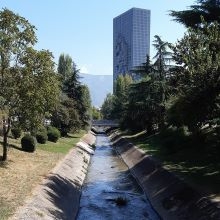Department Sanitation, Water and Solid Waste for Development
Decentralised Sanitation

Cities of the Global South are predominantly non-sewered. SESP investigates the role of decentralised or small-scale sanitation systems and their potential to support sustainable urban sanitation. Our research takes a holistic view of the enabling environment for scaling up such systems, focusing on governance, the regulatory frameworks and the stakeholders and the institutions involved. In collaboration with municipal and national authorities, SESP conducts analysis of pilot and full-scale implementation of decentralized systems. We also develop and disseminate capacity building and decision-making tools that enable informed, evidence-based selection of sanitation systems for planning purposes.







